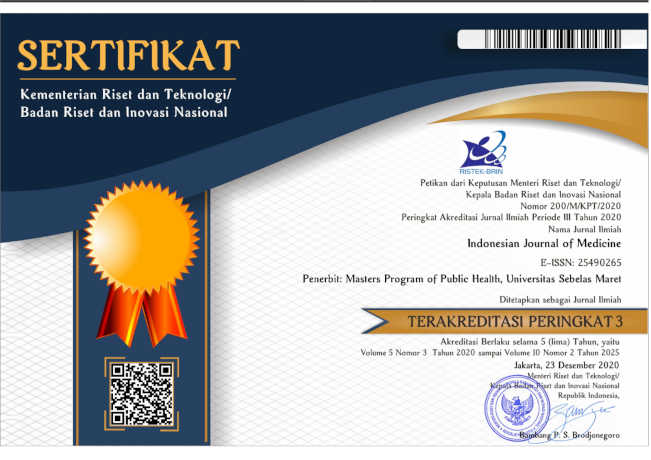Meta-Analysis: Effect of Probiotics on the Frequency and Duration of Diarrhea in Children Under Five
DOI:
https://doi.org/10.26911/theijmed.2020.5.4.352Abstract
Background: Digestive tract disease is still a health problem around the world, currently there are 2,544,084 cases of diarrhea in Indonesia in 2016. In the Central Java region, there are an estimated of 911,901 cases of diarrhea, while 95,635 cases of diarrhea have been handled. This study aims to estimate the magnitude of the effect of probiotics on the frequency and duration of diarrhea among toddler based on the results of a number of similar previous studies.
Subjects and Method: This study was a systematic study and meta-analysis, with PICO as follows: Population= children under five. Intervention= Probiotics. Comparison= Not Probiotic. Outcome= Frequency and Duration of Diarrhea in toddlers. The articles used in this study were obtained from several databases including PubMed, Springer Link, Cochrane Database, Hindawi, Elsevier, JBBA, LWW, Google Scholar. The keywords for searching articles are as follows: "Probiotic", OR "frequency", OR "diarrhea", "kid", OR child "AND" Randomized Controlled Trial (RCT). The articles included in this study were full text articles with a randomized controlled trial study design. Articles were collected using PRISMA flow diagrams. Articles were analyzed using the Review Manager 5.3 application.
Results: A total of 12 articles reviewed in this meta-analysis study originated from India, Canada, Indonesia, America, Iran. Studies showed that the effect of probiotics decreased the frequency (Standarized mean difference -0.32; 95% CI= -0.67 to 0.03 p= 0.070). The effect of probiotics reduced the duration of diarrhea in children under five (Standarized mean difference= -0.74; 95% CI= -1.60 to 0.12 p= 0.090).
Conclusion: Probiotics reduced the frequency and duration of diarrhea in toddlers.
Keywords: Probiotics, Frequency, Diarrhea, Toddlers
Correspondence: Wahyu Agustin Dwi Ciptaningtyas. Masters Program in Public Health, Universitas Sebelas Maret. Jl. Ir. Sutami 36A, Surakarta 57126, Central Java. Email: agustinfaa@gmail.com.
Indonesian Journal of Medicine (2020), 05(04): 321-330
https://doi.org/10.26911/theijmed.2020.05.04.07.
References
Hatta M, Supriatmo AM, Sinuhaji AB, Hasi-buan B, Nasution FL (2011). Compa-rison of zinc-probiotic combination therapy to zinc therapy alone in redu-cing the severity of acute diarrhea. J Dent, 51(1): 1-6.
Htwe K, Yee KS, Tin M, Vandenplas Y. (2008). Effect of Saccharomyces bou-lardii in the treatment of acute watery diarrhea in Myanmar children: a ran-domized controlled study. Am J Trop Med Hyg, 78 (1): 214-216.
Lolopayung M, Mukaddas A, Faustine I (2013). Evaluasi penggunaan kombi-nasi zink dan probiotik pada penang-anan pasien diare anak di instalasi rawat inap RSUD UndataPalutahun (Evaluation of the use of a combina-tion of zinc and probiotics in the management of pediatric diarrhea patients in the inpatient installation of the Undata Hospital, Palu). J Sci Technol, 1(1) : 1-8.
Murti B (2018). Prinsip dan metode riset epidemiologi (5th ed). Surakarta: Program Studi Ilmu Kesehatan Masyarakat.
Pandey KR, Naik SR, Vakil BV (2015). Pro-biotics, prebiotics and synbiotics-a re-view. Int J Food Sci Technol, 52(12): 7577-7587.
Rajagukguk S, Manoppo C, Mantik M (2013). Pengaruh pemberian probiotik dan sinbiotik pada anak dengan diare akut di RSUP Prof. Dr. R.D Kandou Manado (The effect of probiotics and synbiotics in children with acute diarrhea in Prof. Dr. R.D Kandou Manado). Jurnal e-Biomedik (eBM). 1(1): 587-591.
Sudha MR, Jayanthi N, Pandey DC, Verma AK (2019). Bacillus clausii UBBC-07 reduces severity of diarrhoea in child-ren under 5 years of age: a double blind placebo controlled study. Benef Microbes, 10(2): 149-154.
Waspada IMI (2012). Suplementasi pro-biotik pada terapi standar zinc dan cairan rehidrasi oral pada anak usia 6–36 bulan dengan diare akut (Probiotic supplementation with standard zinc therapy and oral rehydration fluids in children aged 6–36 months with acute diarrhea). Tesis. Jakarta. Universitas Indonesia.
WGO (2008). Probiotics and Prebiotics. World Gastroenterology Organisation. https://www.worldgastroenterology.org/guidelines/globalguidelines/probiotics-and-prebiotics.











